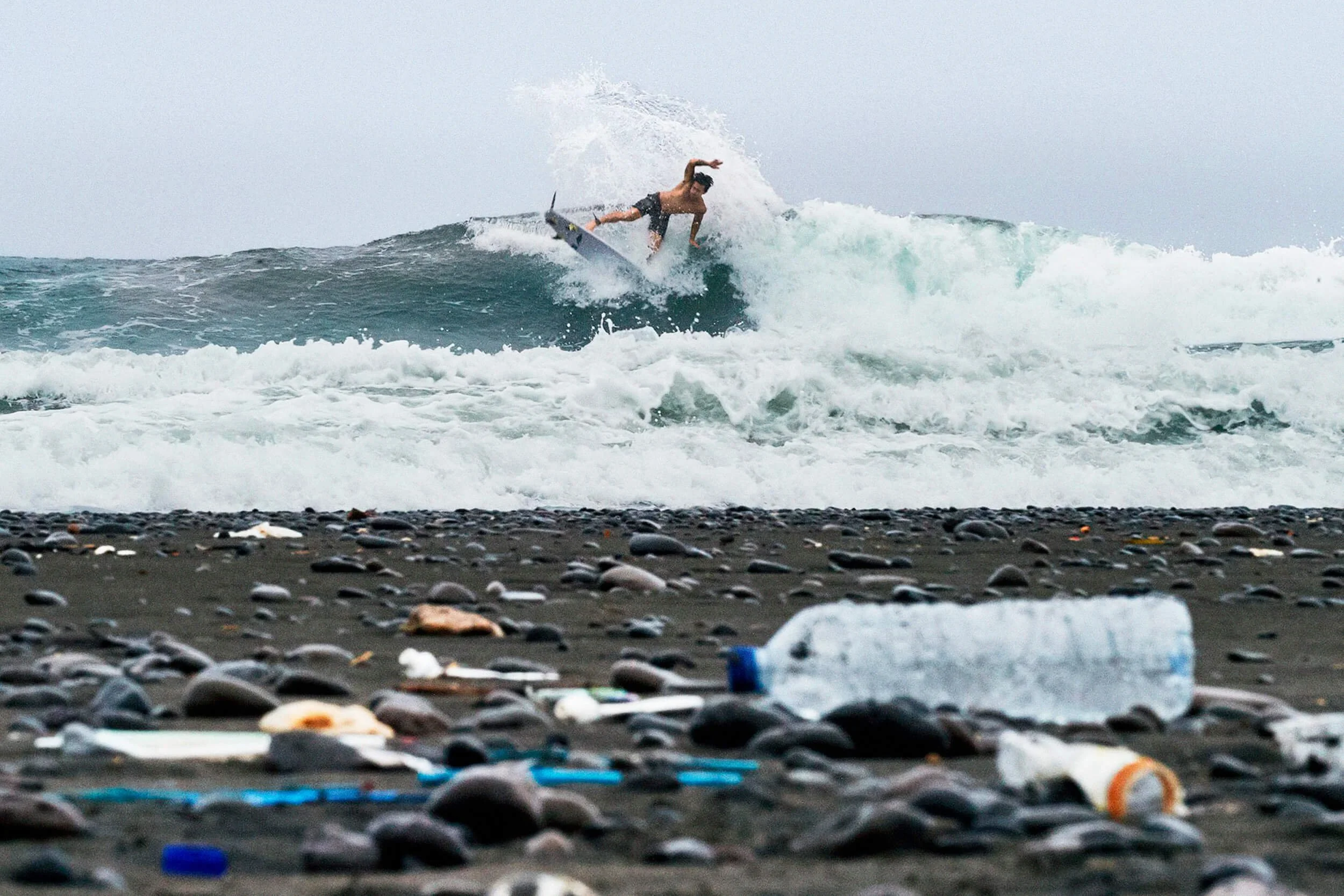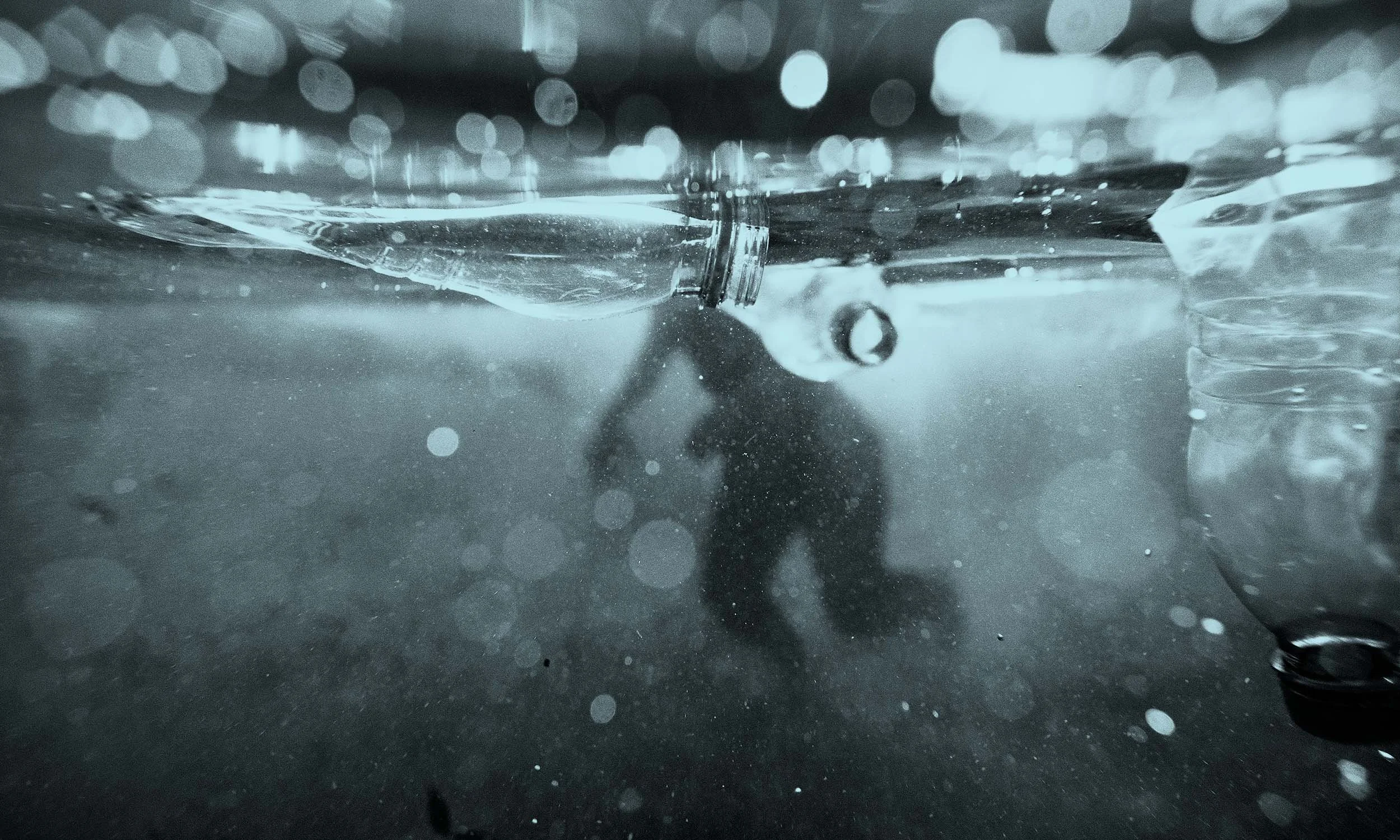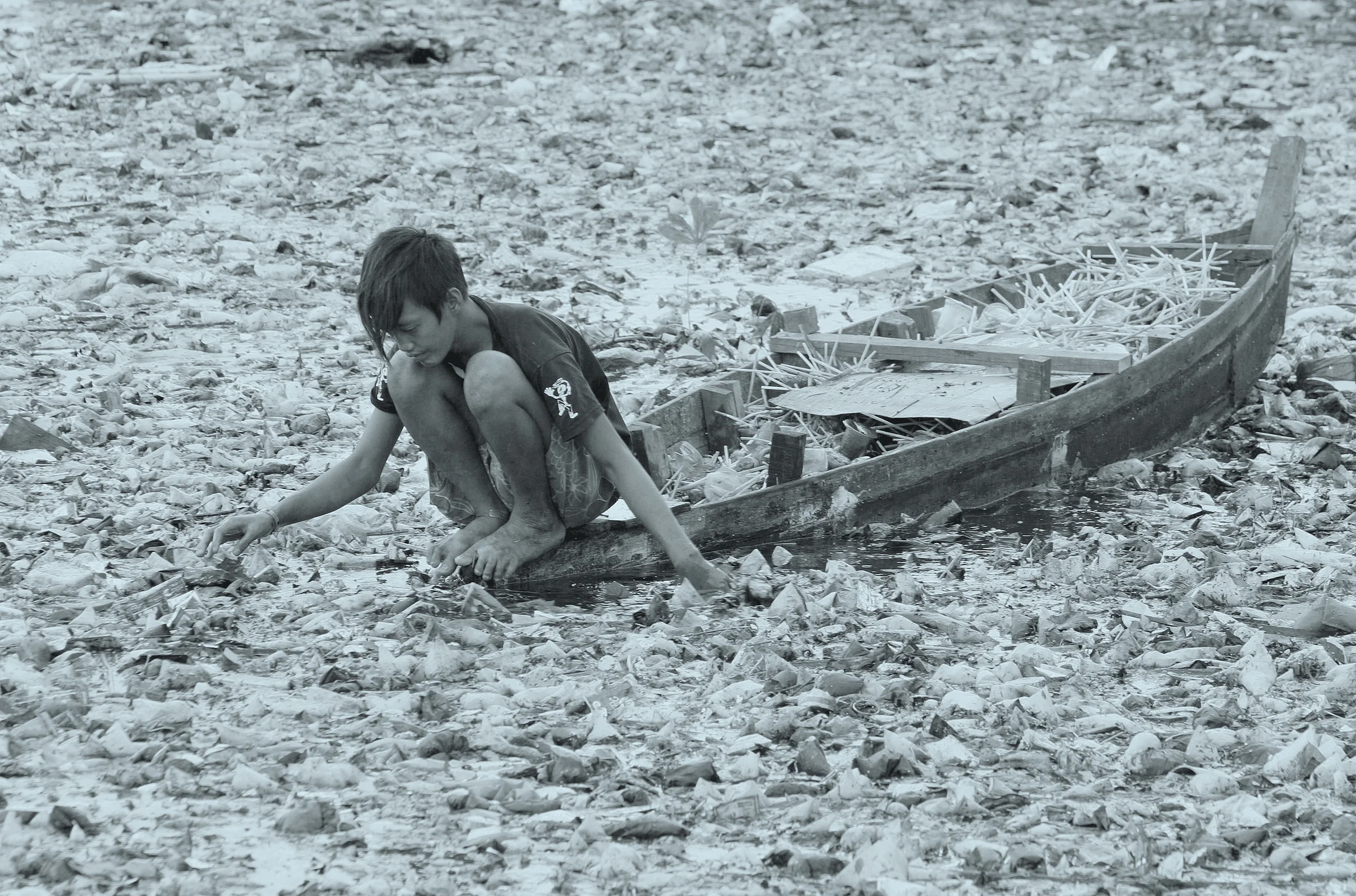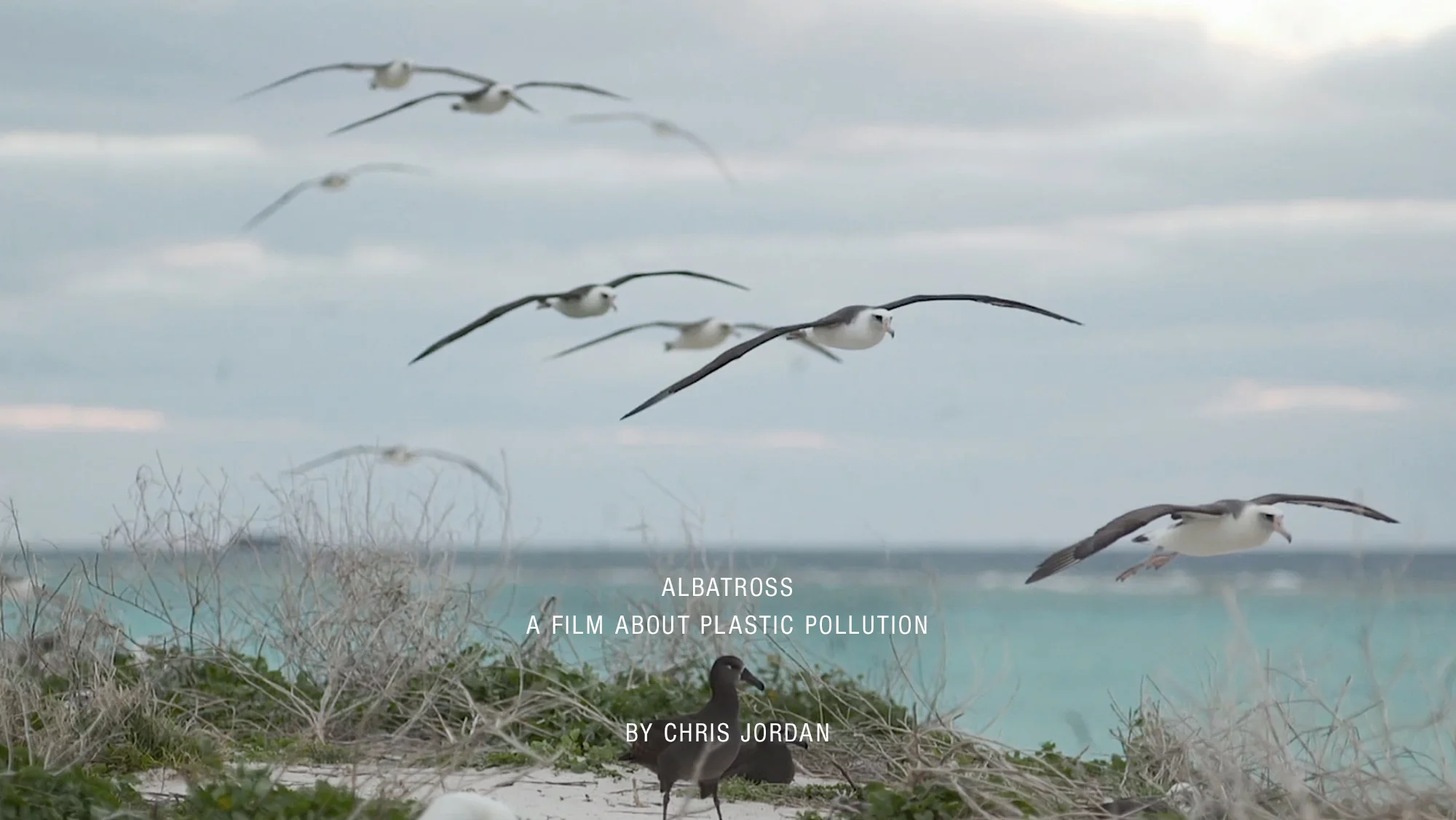




THE PARLEY AIR STRATEGY
THE PARLEY AIR STRATEGY
The oceans give us life. We give them plastic. Let’s invent our way out of this. Together.
Parley AIR is the strategy to end the fast-growing threat of marine plastic pollution. We believe plastic is a design failure, one that can only be solved by reinventing the material itself. To create change, we can stop producing more plastic right away and use up-cycled marine plastic waste instead. Everyone has a role to play.
AVOID PLASTIC WHEREVER POSSIBLE
INTERCEPT PLASTIC WASTE
REDESIGN THE MATERIAL ITSELF
HERE ARE THE PROBLEMS OUR OCEANS FACE
An estimated 8 million metrics tons of plastic trash ends up in our oceans every year. The ocean currents have formed five gigantic, slow moving whirlpools where the plastic collects, called gyres. Most of the plastic debris sinks or remains in the gyres, however a significant percentage of it washes onto our coastlines daily.
After sunlight photodegrades the plastic into small pieces, aquatic life and seabirds mistake these fragments for food and ingest it.
While it's difficult to know exact figures, a 2012 report from WSPA indicates that between 57,000 and 135,000 whales are entangled by plastic marine debris every year in addition to the inestimable – but likely millions – of birds, turtles, fish and other species affected by plastic marine debris.
New studies show that ingested plastic damages the internal organs of fish. This raises the question about the safety of our seafood.
If we fail to clean up the plastic and stop the continued pollution of the oceans, we are facing the potential extinction of many sea life species and the interruption of the entire ecosystem.
We also risk the health of anyone who eats seafood.
“We’re the big brained animals on this planet and we’re putting everything in danger because we don’t really understand the planet as a whole, and human beings, through our consumption and our waste, are messing with the system.”
Graham Hawkes

MISSION
MISSION
PLASTIC IS A DESIGN FAILURE. WE CAN ONLY END THE PROBLEM WITH A NEW MATERIAL. IN THE MEANTIME WE SAVE MARINE WILDLIFE BY CLEANING UP SHORELINES AND OCEANS AND CUT INTO THE PRODUCTION OF NEW, VIRGIN PLASTIC.
THE APPROACH:
AIR
AVOID. INTERCEPT. REDESIGN.
The majority of the plastic in our oceans is broken into small pieces 1/4 of an inch or smaller and scattered over massive areas. The center of a Vortex, where the plastic concentration is highest, is constantly moving. It is difficult to collect and retrieve this plastic without harming fish and other sea life.
Only a minority of plastic pollution floats on or near the surface, while the majority sinks to the ocean floor. While it still seems impossible to clean up the Vortexes, huge volumes of plastic debris wash up on beaches and shorelines, where it can be collected relatively easily and without complex technology by the global Parley network of cleanup organizations.
Awareness campaigns, cleanup operations and recycling initiatives allow us to help alleviate immediate threats to marine wildlife and reduce the use of virgin plastics in product design, manufacturing and distribution. In close collaboration with major brands, we also work to reduce overall plastic use.
But we can only end marine plastic pollution in the long run if we invent smarter materials and synchronize the economic system of mankind with the ecosystem of nature. Therefore Parley with its global expert network is operating an extensive research and development program to invent alternatives and to establish new industry standards.
“I want to be plastic!” Andy Warhol’s phrase expresses the fascination for a seemingly perfect material. It is sleek, comes in any color possible, looks stunning when brand new and can have specific performance features, which makes it very hard to replace. The truth is, plastic is a design failure. Therefore it is best to avoid plastic and use alternative materials. If not possible, then the use of recycled material is the second best option. It helps to cut down the production of virgin plastic. Parley works closely with its corporate partners to reduce and replace plastic in consumption, production and distribution, and on educational programs for employees, partners and consumers.
The primary mission of Parley for the Oceans is to save as many animals as possible. The global Parley network of cleanup organizations achieves this by removing plastic from shorelines and ghostnets from the high seas. In remote areas, we establish systems to intercept plastic waste before it ends up in landfills, gets burned, buried or tossed into rivers or oceans. We don’t see recycling as the ultimate solution for plastic pollution, but keeping plastic that has been already produced in use as a replacement for virgin plastic reduces emissions and waste. Together with its corporate partners, Parley develops programs which cut into plastic production and drive longer-term solutions.
Today, a sexy product made in an eco innovative way can be the most efficient advertising for a cause. It is a proof of concept for new technologies or materials and creates strong media attention. Additionally, Parley partner products made with Ocean Plastic® reposition recycling materials as desirable and contribute to the funding of AIR. An extensive research and development program focuses on up-cycling of marine plastic debris, prevention and interception of microplastic, and new models that can disrupt traditional plastic product categories. To end the cycle of plastic pollution for good, Parley and its partners are working on the development of new materials which can replace current plastic.

OCEAN PLASTIC PROGRAM
OCEAN PLASTIC PROGRAM
"It took centuries to create the mess. No magic bullet will solve it overnight. It will take time, creativity, and hard work."
– John Warner, Founder of Green Chemistry
We see the key to ending marine plastic pollution in collaboration. Nobody can solve this problem alone. We need to approach it from different angles and in a multidisciplinary way. The responsibility lies with the creative industries, followed by major brands, environmentalists, and finally by consumers.
OCEAN PLASTIC®
Turning products into symbols of change
Ocean Plastic® allowed us to put marine plastic pollution in the global spotlight. It’s a catalyst for the Material Revolution and helps fund initiatives of our Ocean Plastic Program focused on: direct impact, communication and education, eco-innovation, and research and development.
The following initiatives are part of the Parley Ocean Plastic Program:
GLOBAL CLEANUP NETWORK
Every piece can save a life. With an international network of partners we remove plastic debris from coastlines and intercept it in remote areas, where no solid waste management exists. Research, education and creating awareness are important parts of each cleanup.
GHOSTNET RETRIEVAL
Repurposing deathtraps. Discarded fishing nets continuously kill sea life when left in the oceans, but they become impactful messengers for the cause when recycled. After being retrieved from high seas and shorelines, the former ghostnets get upcycled to create signature products.
OCEAN PLASTIC® MATERIALS
From trash to premium. Together with leading material experts, labs and innovators, we give plastic waste new life in ways that reduce the use of virgin plastics and catalyze awareness, funding and eco innovation toward long-term change.
RE-INVENT PLASTIC
Reverse the unstoppable. Current plastic is a design failure. At Parley we believe we can only end plastic pollution if we invent our way out of this mess. Our collaborative green chemistry network is working on new materials and production methods to boost eco innovation.
CLEAN WAVES
A creative fundraising platform aimed at boosting the use of eco-innovative materials in fashion and industrial design, Clean Waves incorporates underused forms of upcycled marine debris intercepted from islands, coastal communities and the open ocean.
OCEAN SENTINELS
Big data on ocean health. Instead of sending our own research vessels, we are gathering a network of sailors and fleet owners to run water tests and trawl for plastic pollution. With our partners we are developing equipment and an open-source citizen science platform.
PARLEY OCEAN SCHOOL
Jacques Cousteau said, “People protect what they love." But we only love what we know. Our educational programs connect the next generation, today's opinion leaders, and executives with the sea so they may become insiders and ambassadors for the cause.
MICROPLASTIC RESEARCH
Catch the invisible. Tiny plastic fibers and particles are rapidly spreading through waterways and into our oceans. Or they break down from larger pieces in the gyres. Our objective is to consolidate existing knowledge and develop new tools and methods to stop the pollution.
AIR IMPLEMENTATION
A plan is only as good as its implementation. With the mindset of collaboration and cross intelligence, we are working closely with corporate partners, governments and nonprofit organizations to make the AIR Strategy the new industry standard.
MATERIAL REVOLUTION
In close collaboration with major brands, artists, activists, creators, thinkers and leaders, Parley is working to reduce overall plastic use and create the future of materials that can replace it.
Awareness campaigns, cleanup operations and Ocean Plastic® allow us to help alleviate immediate threats to marine wildlife and reduce the use of virgin plastics in product design, manufacturing and distribution.
But we also recognize that we will only end marine plastic pollution in the long run if we invent smarter materials and synchronize the economic system of mankind with the ecosystem of nature. Therefore, together with a network of experts, Parley operates an extensive research and development program to invent alternatives, support eco-innovation and establish new industry standards to shape a new culture of creativity and collaboration.

JOIN THE MOVEMENT
JOIN THE MOVEMENT
NO OCEANS. NO AIR. NO LIFE.
Let’s invent our way out of this mess. Together.



















